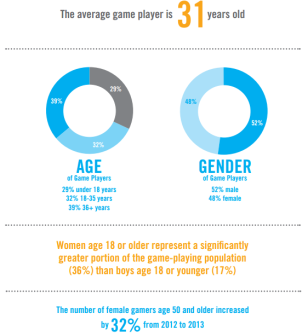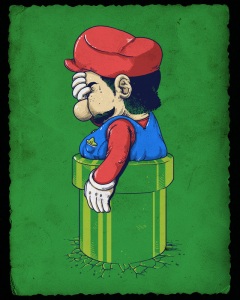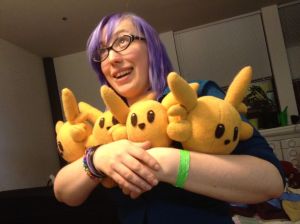I’ll begin in the thick of it: a week ago, feminist video blogger Anita Sarkeesian (@femfreq), notable for her Tropes vs Women in Video Games series, left her home in fear for her safety in the wake of violent threats against her and her family. You probably already know this. You probably already know that Sarkeesian has long been the target of threats and harassment, including a 2012 game entitled Beat Up Anita Sarkeesian. I will not link to it, but suffice it to say that it is self-explanatory. She has documented some of it here. You may even know that this most recent bout of threats of violence, sexual and non, came from an individual who made it clear to Sarkeesian that they had acquired her address, and that of her parents. This individual declared their intent to murder them.
 If there was any of that you did not know, please take a moment to sit, mouth agape, in rage and horror. However, if you’re barely surprised, no one could blame you. Not after thousands demanded that Carolyn Petit be fired for so much as suggesting that GTA V’s treatment of women is problematic, to say nothing of transphobic threats and harassment. Or after Miranda Pakozdi was harassed into quitting a video game tournament by her own team’s coach. You could probably name a million other incidents where someone in the gaming community has been abused, threatened, demeaned, or had their privacy invaded. All those events, recent and more distant, are tied together by the fact that the targeted persons dared to criticize or declare real the once-troubling-now-terrifying misogyny of “gamer culture”. Or they simply dared to be women in that culture.
If there was any of that you did not know, please take a moment to sit, mouth agape, in rage and horror. However, if you’re barely surprised, no one could blame you. Not after thousands demanded that Carolyn Petit be fired for so much as suggesting that GTA V’s treatment of women is problematic, to say nothing of transphobic threats and harassment. Or after Miranda Pakozdi was harassed into quitting a video game tournament by her own team’s coach. You could probably name a million other incidents where someone in the gaming community has been abused, threatened, demeaned, or had their privacy invaded. All those events, recent and more distant, are tied together by the fact that the targeted persons dared to criticize or declare real the once-troubling-now-terrifying misogyny of “gamer culture”. Or they simply dared to be women in that culture.
These women and their supporters have been called “feminazis”, told that they’re overreacting and creating something from nothing, told that there is no misogyny in gaming, while being threatened with sexual violence and called any number of misogynistic slurs. I can only imagine the cognitive dissonance necessary to threaten to rape someone for claiming that there is misogyny in the community. There’s a long history here of this kind of misogyny, yes, but it casts its shadow over each new conversation and piece of content in our community with its pernicious influence. If we object to that, we should make that known, because that’s how change happens. Anita Sarkeesian is doing exactly that. For example, the video that triggered this most recent wave of violence—yes, violence—against Sarkeesian is this one:
What’s she doing here is critiquing the arrangement of symbols, values, and institutions that make up gaming culture, and that’s what you’re supposed to do. Her work does not substantially differ in format or structure from many other critical analyses. She dresses down the fact that even when women are present or relevant in many stories, they’re relegated to the status of props or plot points. While there are more female characters in games, too often the only way they can effect change in the plot is by being victimized. That’s fucked up. If we learn from the stories we’re told and from the examples we’re given, do we really need one more way to tell people that women are supporting characters at best? That they’re either irrelevant or most useful when on display or in refrigerators? Obviously not, because as Sarkeesian explains:
It’s not enough to simply present misery as miserable and exploitation as exploitative. Reproduction is not, in and of itself, a critical commentary. A critique must actually center on characters exploring, challenging, changing or struggling with oppressive social systems….The truth is that these games do not expose some kind of “gritty reality” of women’s lives or sexual trauma, but instead sanitise violence against women and make it comfortably consumable.
Representation is part of our culture, both the culture of the United States and geek culture, and the best thing about culture is that it’s not immutable. It changes based on forces from within and without. Given the above video and the character of the threats levied at Sarkeesian, it’s difficult to imagine that their intent is something other than punishment or intimidation. That is, they want to punish her for critiquing these representations or to scare her into silence.
It is perhaps worthwhile to note that the line between jokes and what this is, criminal harassment in an attempt to stifle critique, was crossed long ago. We all should recognize crimes for what they are, and we simply shouldn’t stand for them. Not that I approve of any kind of harassment, but targeting threats to someone’s home address and parents is a special, sexual predator kind of awful. But perhaps more relevantly, it’s a method of defense. You see, the people (who I presume are men) who threaten online to rape and abuse women, and then threaten to rape and abuse the people who point out that it’s a fucked up thing to do, are attempting to defend a status quo that puts women in their place—because god forbid they have opinions.
In a community that increasingly bemoans its own commodification and the drowning of independent content in a sea of pandering mediocrity, it’s strange to see that the loudest voices and all of their tacit accomplices prefer women as booth babes or window dressing. The fact that the gaming culture we’ve created finds women in those roles acceptable, if occasionally irritating, but finds woman as competitors, critics, and agents of change so threatening that they must be silenced is proof positive of the argument Sarkeesian makes in her most recent video. It makes it clear that women having a say in their representation, even in this little corner of the world, is a challenge to the status quo. I’ve chosen to interpret that as a good thing. Looked upon as whole, geek culture is a misogynist, racist, corporate mess and needs challenging.
That’s easier said than done, however, because it’s not enough to call out the most extreme examples of misogyny within a subculture. It’s crucial that the male members of the community take this to heart. The women in our community are standing up for themselves, consequences be damned. But as men, we have a responsibility to interrogate why the consequence of observing the truth and challenging our privilege is death threats. This is one of those situations where we can either be part of the solution or be part of the problem. We shouldn’t be settling for just decrying and dismissing the actions of the vocal minority who choose to intimidate women in this fashion. To do that without challenging the misogyny woven into the background of geek culture simply allows us to distance ourselves from it, without taking any responsibility for the progression of our community. That, in turn, allows the perpetrators to imagine that there is a large part of the community that agrees with and supports their behavior. I understand that it is easier to remain quiet, to explain these violations away. But if we male geeks actually oppose this behavior, being unwilling to oppose not just the behavior but the elements of our culture that support it when women are doing it the cost of their sanity and safety seems cowardly, doesn’t it?
Between what was done to Anita Sarkeesian and the counterproductive feeding frenzy surrounding Zoe Quinn and the information sent out by her jilted lover, the web is inundated with articles about how gamer culture is dead, about how the community is “eating itself”, and how the word “gamer” itself is an antiquity. They all take different approaches to the notion that the events of the last several weeks, and really the past several years of gaming, have led a community once united to be destroyed by inner conflict and mistrust. Some of these arguments are remarkably convincing, calling out how journalistic integrity in the gaming community is in danger, or how the influence of gaming companies has reduced gamers to vacuous consumers who will only make changes because of corporate bottom lines. Most of them, however, seem to stray wide of actually confronting the misogyny, and many of those that do seem to end up back at victim-blaming somehow, like this nobly-intentioned piece over at Slate.
I’d like to raise the possibility that this is what change in our community is going to look like. It’s going to be ugly, and the jerks and the harassers and the abusers are going to target people who stand up to them, from Anita Sarkeesian to Joss Whedon and Phil Fish. This is our community redefining itself and all of us are presented with a choice of whether we want to sit quietly while change happens or whether we want to take part it in it. This will not be the last example of unacceptable treatment of women in the gaming community, because the misogyny is both structural and cultural. It will resist any effort to make the community less white, less male, less centralized, less cis, less straight, or less privileged. Them’s the breaks.

from the Entertainment Software Association
The thing is that the gaming community isn’t eating itself. Misogyny is eating the community. Racism is eating the community. Fear of change is eating the community, and corporate interests are more than happy to exploit these divisions, or pander to the basest desires of the primary video game market, males age 18–25 (though they no longer represent the largest segment of the community). The community is in a crisis moment, which means that there exists the potential for a transition. Now is the moment. While the media forecasts the death of gaming, why can’t we surprise them and come back with a community that embraces discourse, one that is moving toward something fundamentally different from the past? There will always be hateful, awful people on the internet, but we don’t have to tolerate or accept it.
If you want to be a part of the solution, the first step is simple: acknowledge the truth about our community. Realize that the threats and abuse against Quinn and Sarkeesian do not exist in a vacuum. The next step is to use whatever tools are at your disposal to change the attitudes and structures that condition these behaviors. If you’re a man, that means not resting on your privilege, but using it to confront the very structures that grant your privilege. It will be hard work, but good work. Every opportunity to do this that we miss endangers the civility of our community and allows forces that care not about us but money to define our community. Certainly that is unacceptable.
Men, if you’re looking for examples of men not standing up for this kind of bullshit, try Joss Whedon’s: he acknowledges the misogyny endemic to the medium of video games and uses his huge platform to encourage his followers to actually engage with Sarkeesian’s material. His platform is as wide-reaching and effective as it in part because he is white, straight, rich, and famous, and that privilege lends credibility to his assertions. If you’re reading this, you’re probably not Joss Whedon, but you can do the same thing writ smaller. Egoraptor (Arin Hanson), famous for The Awesome Series and Game Grumps has done just the same on his twitter account, insisting that “If a woman is driven out of her home because of an internet video about misogyny, maybe that’s a sign it’s still a problem.” Tim Colwill, EIC over at games.on.net, has issued a statement on his website letting those offended by equality know where the door is. He strikes the nail directly on while waving goodbye to those who feel so very threatened by forward progress:
The problem here is that these squealing man-children, so desperate to keep women out of their precious games, want it both ways. They want gaming to be taken seriously as a culture and art form, while at the same time throwing an unbelievable tantrum when subjected to serious criticism.
There’s even this open letter to the gaming community which simply asks that “If you see threats of violence or harm in comments on Steam, YouTube, Twitch, Twitter, Facebook or reddit, please take a minute to report them on the respective sites. If you see hateful, harassing speech, take a public stand against it and make the gaming community a more enjoyable space to be in.” There are a million ways to say that you’re not going to stand for it, and you could always create your own.
It boils down to whether or not you believe that women are people, and thus worthy of being represented as people and treated as people. People aren’t conquests, they’re not window dressing. They have desires, and they are agents for their own goals. If you’re not a woman, take a good hard look at the gaming community and tell me the same doesn’t apply to people of color, or LGBTQ+ people who are often either abused in the community or left out altogether. If you do believe that they are people, then do something about it. It’s that simple.
If you’d like to see a fresh perspective on Quinn’s game Depression Quest, check out BrothaDom’s post here.
Follow Lady Geek Girl and Friends on Twitter, Tumblr, and Facebook!




Great piece. I’m only peripherally attached to video game culture now, and I pulled away not least because of stuff like this. The thin hope I take from these battles is that a.) we’re winning and b.) we’re going to win.
These are conversations were were barely having ten years ago, and most gaming interactions were just strings of racial slurs on Battle.net. Now, while there are hordes of trolls, there are fewer and fewer prominent voices on the side of evil, and content and marketing is gradually moving away from them.
The goal is going to have to be to drive trolls away from any relevant discourse on the Web. Comment moderation is a start, and necessary wherever we’re talking games. A lot of spaces could take a page from Hearthstone and cut off unnecessary chatter altogether.
The problem remains the semi-legitimate zones like Reddit, where trolls can gain power with the veneer of respectability that comes from existence on a prominent website. If Reddit doesn’t clean itself up (much less 4chan), we need to pull away from it, and encourage content creators to follow.
Pingback: Nobody Expects the… Straight White Dude?: Disappointment in Dragon Age: Inquisition | Lady Geek Girl and Friends
Pingback: Why I Don’t Buy #Gamergate | Lady Geek Girl and Friends
Pingback: Sexualized Saturdays: Starring People or About Them? | Lady Geek Girl and Friends
Pingback: Raising the Bar: Gamergate & CrashOverrideNetwork | Lady Geek Girl and Friends
Great article, thank you! I’m not a gamer, so I’m not really connected to this world. But Anita Sarkeesian’s videos were a dismaying eye-opener, and what’s happened to her since is horrifying.
Pingback: No Really, Trust Me: Pan’s Review of Loki: Agent of Asgard #12 | Lady Geek Girl and Friends
Pingback: Joss Whedon, Driven Off Twitter By “Feminazis?” Um, No. | Lady Geek Girl and Friends